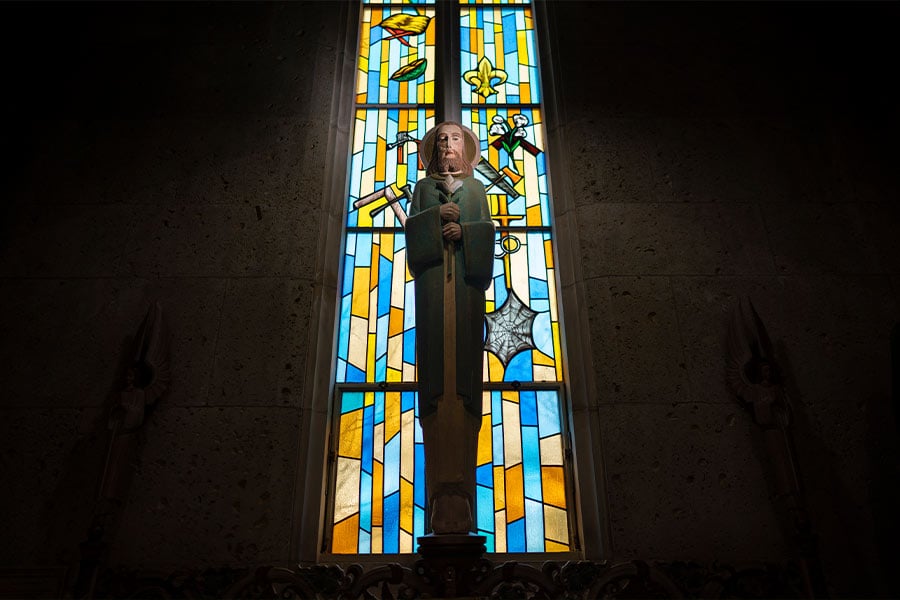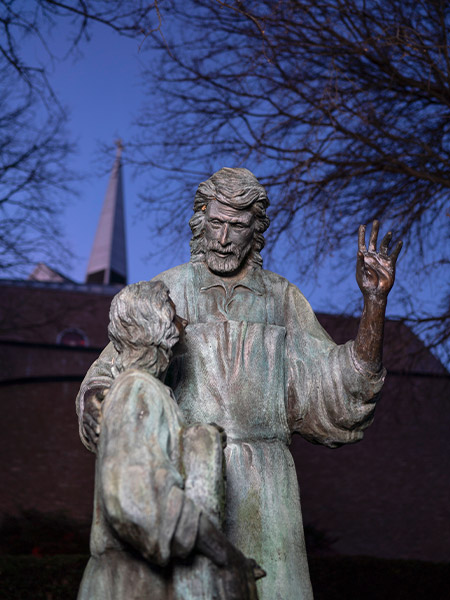St. Joseph, model father - Part 2

A statue of St. Joseph at Sacred Heart Parish in Muenster. (NTC/Juan Guajardo)
Exemplar of Silence
“Joseph found happiness not in mere self-sacrifice but in self-gift. In him, we never see frustration but only trust,” writes Pope Francis. “His patient silence was the prelude to concrete expressions of trust. Our world today needs fathers. … Every true vocation is born of the gift of oneself, which is the fruit of mature sacrifice.”
Dcn. Endres shared that when teaching religion class at the parish, he’ll ask attendees, “What were the last words St. Joseph ever said?” The question stumps the students, because there are no recorded words of St. Joseph in Scripture. The spiritual leadership of the Holy Family entrusted to Joseph was done with few words, he explained.
“Sometimes Daddy — or any kind of leader, really — doesn’t have to do a lot of talking. The man should lead by his actions. If the kids see you going to church and praying, they’re going to pay more attention,” he said. “That’s how the dad leads — he leads by example and speaks when he needs to.”
The Scriptures record that in the years between finding Jesus in the Temple and His Baptism, Jesus “advanced [in] wisdom and age and favor before God and man.” Also known as the silent years of Jesus, this would be the timeframe that St. Joseph guided and raised his son. Joseph would have taught Him not only carpentry, but Scripture and life skills such as interacting with the world and respecting others, reflected Brown.
“St. Joseph is this strong silent type,” he said. “I think we can learn a lot from the silence of St. Joseph in his calmness and his prayerfulness and his diligence to his family.”
Fr. Kelley noted that while the Scriptures don’t record any words by St. Joseph, they do describe his actions, which can have a bigger impact.
“We just see him by his actions. It’s important to see what he’s done by taking Mary into his home and raising Jesus as his own child,” the pastor said. “He also cares for his Son and takes Him away from the danger by taking Mary and the baby Jesus into Egypt. When Jesus is 12 years old, both Mary and Joseph are in search of Jesus, and He was in the temple. We have words by Mary, but it’s his parents — a father — caring for his child.”
Most Obedient, Most Faithful
“At the end of every account in which Joseph plays a role, the Gospel tells us that he gets up, takes the Child and His mother, and does what God commanded him,” writes Pope Francis. “Indeed, Jesus and Mary His Mother are the most precious treasure of our faith.”
Of the three members of the Holy Family — Jesus, Mary, and Joseph — Joseph is the only one who was born with original sin. This extraordinary ordinariness gives hope to the rest of humanity that sanctity can be attained.
“We think we have to be extraordinary to be a saint,” said Lopez. “All he did was say, ‘Yes’ to God. He was a righteous man devoted to Scripture, and we can do that in our lives — it’s just a matter of committing to it and following through the way that he did.”
Brown said that while St. Joseph hadn’t intended to raise the Son of God when he courted Mary, he “joyfully and willingly picked that up and raised Jesus as his own” — a task he didn’t have to do.

“He could have so easily walked away, and we see so many families in our time that are torn apart because it’s just too hard, and not fulfilling what we’re given,” Brown said. “It’s more about obedience to one’s state in life. Obedience brings about humility. St. Joseph — through his obedience — grows in humility, grows closer to that moment to spend eternity in God.”
Model of artisans and patron of workers
Because of his role as patron of workers, St. Joseph is the adopted patron for Young Catholic Professionals. It’s easy for professionals to compartmentalize their faith when they’re working, said Lopez.
All YCP meetings and events close with the St. Joseph the Worker Prayer, he said.
“For us having him as our patron saint, it’s a good way to focus ourselves back to St. Joseph and make him a prominent figure in what we’re doing with our lives.”
St. Joseph serves as a model for encountering Christ through work, as he must have done in teaching Jesus the carpentry trade, said Brown.
“The Holy Fathers write about that, stressed the importance of just work, safe work, the idea of work as more than just a means to a paycheck,” he said. “You can take your prayer into the work you do.”
Brown, who as a former youth minister also led teens for 15 years in constructing baby cribs at Camp Fort Worth to donate to Gabriel Project, said that beyond the paycheck, work has meaning beyond the action.
“That’s something we instilled in the kids at Camp Fort Worth. We’d begin the day with teaching them about why we were building the cribs in the context of being pro-life, doing what we can to end abortion, and giving these mothers a chance,” he said. “It’s not just the work we were doing, but we should be praying for the mothers who will be making use of these cribs, for the child who will be laying down his head in these cribs, so that work that we’re doing is meaningful. Our work becomes something greater inherently than just building something or creating something. It has a greater purpose with those prayers that are attached to it. When you’re building cribs for single mothers in need, there’s a lot you can impart through prayer as you’re measuring, cutting, assembling.”
